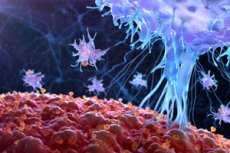New publications
Ultrasensitive liquid biopsy technology detects cancer earlier than standard methods
Last reviewed: 02.07.2025

All iLive content is medically reviewed or fact checked to ensure as much factual accuracy as possible.
We have strict sourcing guidelines and only link to reputable media sites, academic research institutions and, whenever possible, medically peer reviewed studies. Note that the numbers in parentheses ([1], [2], etc.) are clickable links to these studies.
If you feel that any of our content is inaccurate, out-of-date, or otherwise questionable, please select it and press Ctrl + Enter.

An AI-based method for detecting tumor DNA in the blood has demonstrated unprecedented sensitivity in predicting cancer recurrence, according to a study led by scientists at Weill Cornell Medical School, NewYork-Presbyterian, the New York Genome Center (NYGC), and Memorial Sloan Kettering (MSK). The new technology has the potential to improve cancer treatment by detecting recurrence very early and closely monitoring tumor response to therapy.
In a study published June 14 in the journal Nature Medicine, the researchers showed that they were able to train a machine learning model, a type of artificial intelligence platform, to detect circulating tumor DNA (ctDNA) based on DNA sequencing data from patients’ blood tests with very high sensitivity and accuracy. They successfully demonstrated the technology in patients with lung cancer, melanoma, breast cancer, colon cancer, and precancerous colon polyps.
"We were able to achieve a significant improvement in signal-to-noise ratio, allowing us, for example, to detect cancer recurrence months or even years before standard clinical methods can," said study co-author Dr. Dan Landau, professor of medicine in the division of hematology and medical oncology at Weill Cornell Medical School and a core member of the New York Genome Center.
A co-author and first author of the study was Dr. Adam Widman, a postdoctoral fellow in Landau’s lab who is also a breast oncologist at MSK. Other first authors were Minita Shah of NYGC, Dr. Amanda Frydendal of Aarhus University, and Daniel Halmos of NYGC and Weill Cornell Medical School.
Liquid biopsy technology has been slow to realize its great potential. Most existing approaches target relatively small sets of cancer-associated mutations that are often too rare in the blood to be reliably detected, leading to underestimation of cancer recurrence.
Several years ago, Dr. Landau and his colleagues developed an alternative approach based on whole-genome sequencing of DNA in blood samples. They showed that this could collect much more “signal,” making it possible to detect tumor DNA more sensitively and logistically. Since then, this approach has increasingly been adopted by liquid biopsy developers.
In the new study, the researchers took it a step further by using an advanced machine learning strategy (similar to that used in popular AI apps like ChatGPT) to detect subtle patterns in the sequencing data, specifically to distinguish patterns indicative of cancer from patterns indicative of sequencing errors and other "noise."
In one test, the researchers trained their system, which they called MRD-EDGE, to recognize patient-specific tumor mutations in 15 colon cancer patients. After surgery and chemotherapy, the system predicted, based on blood data, that nine of them had remaining cancer. Five of those patients later had recurrence detected by less sensitive methods several months later. But there were no false negatives: None of the patients MRD-EDGE had counted as free of tumor DNA recurred during the study period.
MRD-EDGE demonstrated similar sensitivity in studies in patients with early-stage lung cancer and triple-negative breast cancer, detecting all but one recurrence early and tracking tumor status during treatment.
The researchers demonstrated that MRD-EDGE could even detect mutant DNA from precancerous colon adenomas—polyps from which colon cancers develop.
"It wasn't clear that these polyps could release detectable ctDNA, so this is a significant advance that may point to future strategies to detect precancerous changes," said Dr. Landau, who is also a member of the Sandra and Edward Meyer Cancer Center at Weill Cornell School of Medicine and a hematologist-oncologist at NewYork-Presbyterian/Weill Cornell Medical Center.
Finally, the researchers showed that even without prior training on patient tumor sequencing data, MRD-EDGE could detect responses to immunotherapy in melanoma and lung cancer patients weeks before detection with standard X-ray imaging.
"Overall, MRD-EDGE addresses a big need, and we are excited about its potential and are working with industry partners to try to bring it to patients," Dr. Landau said.
